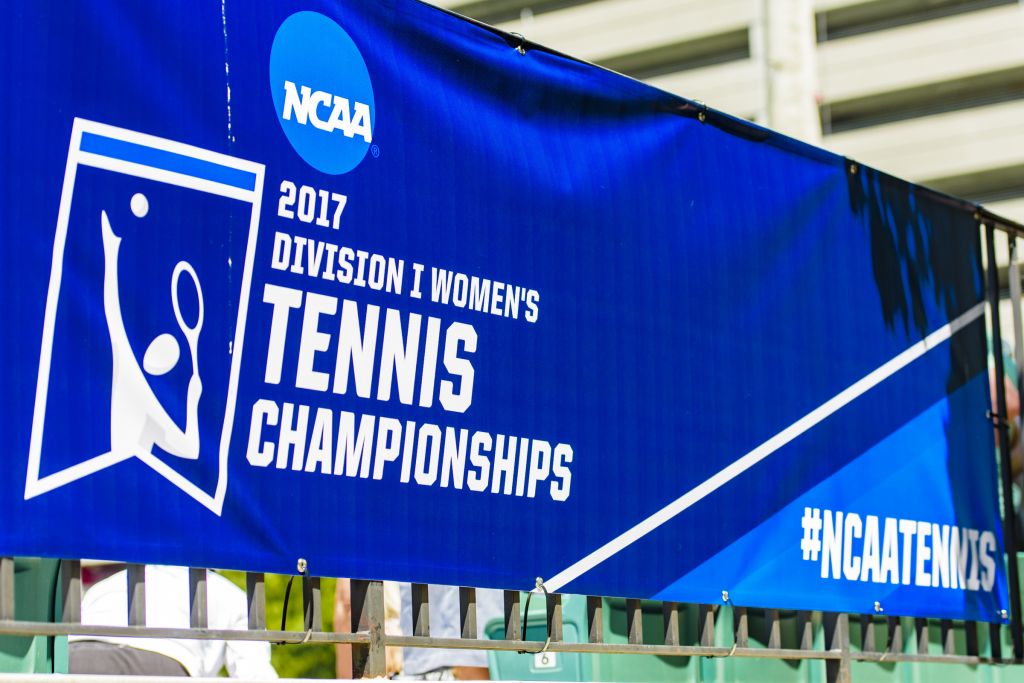July 24, 2017
This story appeared in the May/June 2017 edition of Commodore Nation.
By David Dawson
After making claim to a somewhat-comfortable folding, George Lewis took his station underneath a tent at the far end of the Curry Tennis Center. It would be his spot for several hours during each of the first two days of the SEC Women’s Tennis Championships.
Lewis was assigned to a different post — and a different semi-comfortable chair — on the third day of the tournament, when severe weather in the Nashville area forced the action to move inside. Lewis dutifully made the transition with no complaints, switching to his new station beside the door at the press hospitality room, where he watched with great pride as the Commodores captured the SEC Tournament title.
Lewis, incidentally, didn’t run onto the court to celebrate when the final point was clinched. But make no mistake, he played a role in the championship.
Lewis, who has served as an usher at Commodore sporting events for 15 years, is part of a group of unsung heroes who support Vanderbilt athletics by ensuring that events on the Vanderbilt campus run smoothly from start to finish. The group includes a seemingly countless list of individuals, who do everything from working the merchandise tents to raking the sand pits at track meets.
“Other than the student-athletes themselves, the people who do the behind-the-scenes work are the most important aspect of hosting a quality championship event,” said Drew Fann, assistant athletic director of internal operations, cross country, track and golf. “We simply could not run a successful event without their efforts.
The tireless, and occasionally thankless, work has enabled Vanderbilt to successfully host a countless number of major events through the years, including most recently the SEC Indoor Track & Field Championships, along with the SEC Championships and NCAA Regionals in women’s tennis.
For Lewis, and many of his yellow-vested friends, the long hours are worth it.
“Honestly, it’s an enjoyable thing to do. I was a season-ticket holder at Vanderbilt for years and years, and I’ve always loved coming to games. Back when I was working, I told my wife, ‘After I retire, I want to be an usher.’ And here I am.”
Although Vanderbilt is by far the smallest school in the SEC in terms of enrollment, the Commodore community comes out in full force for major events, banding together for one common purpose: Helping Vanderbilt put on a quality show.
It’s often an all-hands-on-deck type of arrangement, with employees from various departments joining together with members of the community to make sure these events go as smoothly as possible.
The Selection Process
Schools are selected for hosting duties in a variety of ways, depending upon what event is being played. For instance, the SEC Championships in many sports — including tennis and track — rotate between the schools in the conference that have that particular sport.
In women’s tennis, Vanderbilt hosts the SEC Championship every 14 years, since all 14 schools in the SEC have women’s tennis programs. In other sports, like swimming or track, only a few schools in the conference meet the SEC requirements for hosting Championships, leading to a shorter rotation among those schools.
Other sports in the SEC — such as men’s and women’s basketball, soccer and football — have neutral-site championships that are determined years in advance.
“The thing about hosting an SEC Championship is that you literally have years to plan for it,” said Lori Alexander, the senior associate athletic director for soccer, tennis and sports medicine. “It’s not a situation that is sprung on you in the last minute.”
Hosting duties for many NCAA events, however, are not always so clear-cut. In many sports — including baseball, tennis and golf, among others — the sites are determined based on the on-the-field performances of each potential host institution. The teams that finish among the Top-16 in the final rankings are selected to host the regionals, assuming those schools put in bids and meet the proper requirements.
In recent years, Vanderbilt has hosted NCAA Regional events in baseball, tennis, golf and women’s basketball.
“Hosting an NCAA Regional is an honor,” said Alexander. “It’s a lot of work for those involved, but the benefits of it — in terms of exposure for your program and having the comforts of home — certainly makes it worth the effort.”

Teamwork Makes The Dream Work
This spring, as Vanderbilt was preparing to host the SEC Women’s Tennis Championship on campus, Alexander sent out an email to Vanderbilt staff and faculty, seeking volunteers to help work the tournament. The duties included working the merchandise tent, serving in the hospitality room, and working in the player’s gifts suite throughout the five-day event. All told, there were more than 30 time blocks, lasting three hours each, that needed to be filled.
Within hours, Alexander said, virtually every spot was secured.
“It was awesome,” said Alexander. “And it was a perfect example of how our staff comes through.”
Ed Higgins, the assistant athletic director for facilities and event management, said many people don’t realize just how many departments have to come together for an event on campus.
“There are a lot of moving parts,” said Higgins. “You are talking about working with the clean-up staff, looping in the Vanderbilt Police, securing guest services personnel, working with Traffic & Parking to hatch a parking plan, and the list really just goes on and on.”
In many cases, the major events overlap with other sports that are being played on campus. And that’s when teamwork is especially critical.
“I remember that we were really stretched for help on Feb. 25 — which was a Saturday,” said Fann, who helped oversee the SEC Indoor Track and Field Championships at Vanderbilt’s Indoor Facility in February. “That day, we had a home baseball game, a men’s basketball game, and the SEC Championships track meet all going at the same time. And there is no way we could have pulled it off without the combined efforts of the athletics department personnel, Vanderbilt Rec Center employees, and others who surrendered their personal time to volunteer and help out.”
Planning and Preparation
In many cases, the hardest work — and the longest hours — come prior to the event itself.
“We began preparing for the SEC Championships in October, which was almost five months before the event,” said Fann. “This was our first time hosting the Indoor Championships, so we wanted to ensure our staff and our facility were primed for a great event. Our Championships preparation was similar to that of a regular season meet, but on a much larger scale.”
Steve Keith, the head coach of Vanderbilt’s cross country and track & field teams, said he keeps a close eye on what other schools are doing, and then tries to implement some of their techniques at Vanderbilt.
“When we travel to different meets and facilities, I’m always making notes and taking pictures,” said Keith. “Kentucky and Notre Dame have similar oversized tracks, so when we compete at those facilities I’m looking at what works and what would apply to our situation.”
Keith, who served as the event director for the SEC Indoor Track Championships, said he and his staff were able to emulate some of the successful events that they’d seen at other schools while also sprinkling in some new twists that were unique to Vanderbilt.
“Hosting the SEC was quite an undertaking, with so many people involved,” Keith said, “but we put on what I consider to be a great meet, especially for it to be the first time ever in our facility. The number of records (that were set during the two-day meet) was very impressive and a direct reflection as to the quality of our facility.”
Higgins, who has worked behind the scenes at numerous successful events, said he approaches each event as a learning experience and a chance to improve.
“You essentially have to treat each one as a unique event,” he said, “because each venue and event presents its own distinctive challenge. There are also SEC and NCAA guidelines that must be followed for each. We do have a championship plan, and we always keep notes and write a post-event wrap-up. That way when we host the event the next time — for example SEC Indoor Track will be back here in four years — we can review, learn and make changes.”
Regardless of how much planning and preparation are done, there will inevitably be some issues that arise.
“Once the event starts, we are like firefighters,” said Higgins. “We’re just waiting for the call to fix a problem.”
For outdoor sports, the weather is always the biggest X-factor, naturally.
“If we didn’t have to worry about weather it would be easy,” said Higgins. “The biggest keys are having agreed to guidelines, a chain of command and a facility/evacuation plan. During our event planning we identify the system being used, who is in charge and when/how information is sent out. … It is also key to have a chain of command on who makes the call on when play is resumed. That way bad information doesn’t get out.
“The last key is having an inclement weather facility plan,” he said. “Who, what and when do we make weather announcements? Where do participants, support staff and fans evacuate? Who is opening doors and staffing the evacuation site? The answers to these questions have to be in place before the event. Again, our lives are a lot easier when it’s sunny and 70 degrees.”
Reaping the Benefits
The advantages of hosting a tournament can be felt before, during and after the event.
“From a competitive standpoint, certainly it is beneficial for our athletes to be at home for the tournament,” said Alexander. “The kids get to stay in their normal routine, whereas when you travel, it really is exhausting. You’re eating in hotels and even your sleep patterns are different. But when you are at home, you can pretty much stick to business as usual.
“And, of course, you have the home fans cheering for you,” added Alexander, “which is a huge advantage.”
Keith took it a step further, saying that hosting major events is essentially like receiving free advertising for the Vanderbilt athletics.
“In our case, it was basically like ESPN doing a two-hour commercial for Vanderbilt, our program and facility, and the SEC,” he said. “And that kind of exposure is invaluable.”
After the event ends and the team buses all pull out, many of those involved will spend a few days decompressing and reflecting on the successes of the past few days.
“For me, the most rewarding aspect is knowing that we were able to host a high quality meet for our student-athletes, both at Vanderbilt and around the Southeastern Conference,” said Fann. “They spend many hours practicing and honing their craft, and they deserve a well-run championship event to showcase their abilities.”
The impact of hosting an event stretches well beyond the players and competitors, Alexander said.
“It’s a great chance for the community to experience us and to see what Vanderbilt is about,” she said. “We obviously want that to be a very positive experience because this a chance for us to get people on our campus that might not normally come. That’s a huge part of it.”
But the most rewarding part of all?
“Winning championships,” said Alexander with a smile. “Seeing Vanderbilt holding up that trophy — that’s the best.”
And it’s a moment of joy that is shared by everyone involved, from those in the semi-comfortable chairs to the coaches and players themselves.
“It’s a total team effort,” said Alexander.


